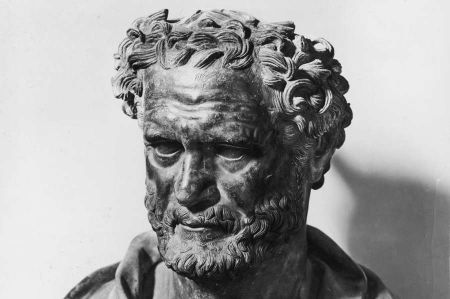The natural philosopher Democritus from Abdera
- Written by Portal Editor
Even in ancient times there were great social differences between rich and poor citizens. Democritus of Abdera was fortunate to be one of the sons of wealthy parents, and from an early age Democritus was fond of spending large sums of money on trips to distant lands.
In his notes he even claimed later that of all the people of his time he had got to know most of the foreign countries. Traveling educates, as does his thesis, which is why he counted himself among the most educated men of all living people of his time.
Democritus, the laughing philosopher

Even if today only a few fragments of the actual writings of Democritus have been preserved, the surviving indexes of writings show that Democritus was able to accumulate an all-encompassing knowledge, which even includes the art of war, physics and chemistry: "The question of the but movement, where and where things come from, they too, like the others, have left aside without racking their brains about it.”
Democritus claims, comparable to his teacher Leucippus, that all of nature consists of the smallest, indivisible particles or units, the atoms. According to a second-century document by Galen, Democritus' central statement on this is this: “It only appears that a thing has a colour, only apparently it is sweet or bitter; in reality there are only atoms in empty space.”
Democritus: A thing only appears to have a color...
According to his ideas, each of these atoms should be solid and massive, but not equal. There would be an infinite number of atoms: round, smooth, irregular and crooked. When these approached each other, fell together, or intertwined, some appeared as water, others as fire, as a plant, or as a human being. In his opinion, sensory perception and soul existence can also be traced back to atomistic principles, in that the soul consists of soul atoms. When a person dies, these soul atoms scatter and can join a new soul that is just forming. Everything that moves in space is based on chance and necessity. This teaching is a consistent and atomistic materialism.
Colliding atoms lead to lateral movements
Just as when the grain is winnowed, chaff comes to chaff and grain to grain, so the whirling motion of natural necessity meant that the lighter had to reach the lighter, the heavier had to reach the heavier, and through the constant entanglement of the atoms the reason for the formation of larger atom aggregates (body) and entire body worlds. One of the bodies that came into being in this way is the earth, which originally, like everything else, was in motion but gradually came to rest, from whose moist state organic beings emerged.
Democritus is said to have lived to be almost 100 years old in this way of looking at the world. He probably died in 400 or 380 BC. Whether all known statements and writings are based solely on his own findings or were taken from his compatriot Leucippus, who is usually mentioned at the same time but is even less well known, cannot be clearly proven due to a lack of evidence.
Please read as well:
